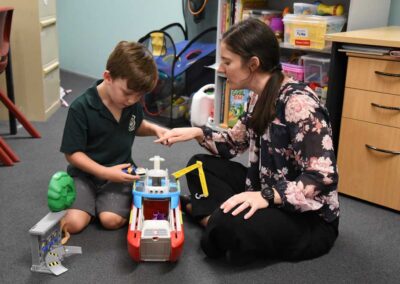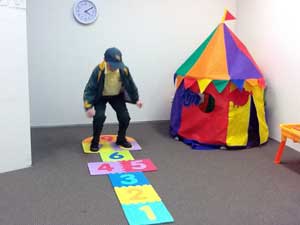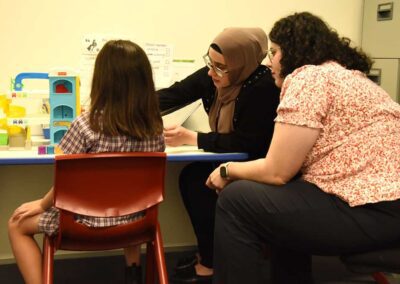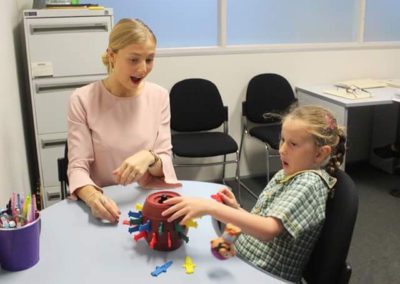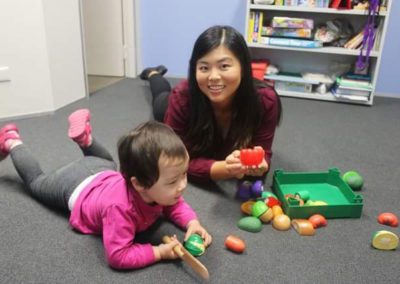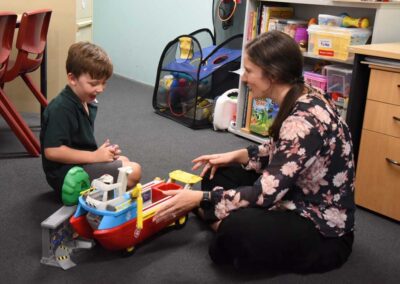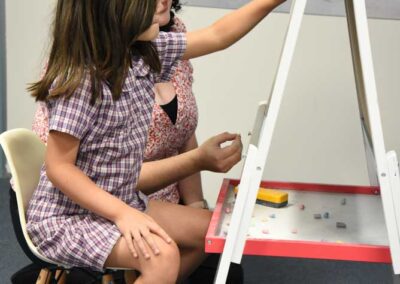As parents, one of the most precious gifts we can give our children is a strong vocabulary. A rich and diverse vocabulary not only enhances a child’s communication skills but also plays a crucial role in their cognitive development. However, parents often focus on labelling items around them when focusing on vocabulary but a child needs to learn a variety of word types in order to talk in sentences. In this blog, we will explore how parents can actively contribute to building their children’s vocabulary by introducing a variety of words, including action words, describing words, location words, words about belonging, and feeling words.
1. Action Words (Verbs):
Action words, or verbs, are the backbone of any sentence. They describe what a person or thing is doing and add vitality to conversations. Here are some ways parents can introduce action words into their child’s vocabulary:

- Narrate Daily Activities: Describe what you and your child are doing throughout the day. For example, “We are cooking dinner. I am chopping vegetables”:
- Play with Action Toys: Engage in activities with toys that encourage action, such as playing with cars, dolls, or building blocks. Describe the actions as you play.
- Read Books: Choose books that are full of action and use a variety of verbs. Act out the actions together as you read.
2. Describing Words (Adjectives)
Describing words, or adjectives, help children paint a more vivid picture when they communicate. They add depth to their descriptions and allow them to express preferences and feelings. Here’s how parents can introduce adjectives:
- Expand on Colors: Instead of saying something is “red” you can say “bright red,” “vibrant red,” or “deep red”

- Use Comparatives and Superlatives: Teach your child words like “bigger,” “biggest,” “smaller,” and “smallest” to help them make comparisons.
- Explore Emotions: Discuss how objects or experiences make your child feel. For example, “This ice cream is so delicious; it makes me happy”
3. Location Words (Prepositions)
Location words, or prepositions, help children understand spatial relationships and provide context to their descriptions. Here’s how parents can introduce prepositions:
- Play Hide and Seek: This classic game helps children learn words like “under,” “behind,” “next to,” and “between.”
- Build with Blocks: Ask your child to stack blocks “on top of” each other, “beside” one another, or “under” another block.
- Explore Nature: During outdoor activities, point out objects in relation to one another using prepositions. “Look, the bird is perched on the branch.”
4. Words About Belonging (Possessive Words)
Words that convey ownership or belonging are essential for children to express their relationships with people and objects. Here’s how parents can introduce possessive words:
- Label Personal Items: Label your child’s belongings with their name, such as “Emma’s backpack” or “Max’s toy box.”
- Discuss Family and Friends: Encourage conversations about who things belong to within the family. “Is this your sister’s teddy bear?”
- Use Possessive Pronouns: Introduce words like “my,” “your,” “his,” and “her” to describe ownership.
5. Feeling Words (Emotions)
Emotions are a vital aspect of human communication and understanding. Teaching children to express their feelings enhances their emotional intelligence. Here’s how parents can introduce feeling words:
- Emotion Charts: Use visual aids like emotion charts with faces displaying various emotions. Ask your child to identify how they feel.
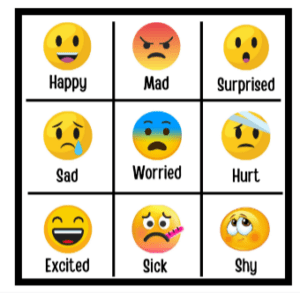
- Tell Stories: Read stories that revolve around emotions and discuss how the characters feel in different situations.
- Check-In Regularly: Ask your child how they feel throughout the day. Encourage them to use words like “happy,” “sad,” “excited,” or “angry.”
Conclusion:
Building a robust vocabulary is a gift that keeps on giving throughout a child’s life. By actively introducing action words, describing words, location words, words about belonging, and feeling words into your child’s daily experiences, you are setting them up for success in communication, comprehension, and self-expression. These foundational skills will not only aid in academic pursuits but also help them navigate the complexities of life with confidence and clarity. So, embrace every opportunity to enrich your child’s vocabulary, and watch them blossom into articulate and expressive individuals.
If you’d like to find out more about developing your child’s expressive language skills contact us at Speak Learn and Grow Contact Us


